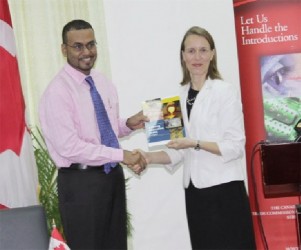Guyana Goldfields Inc (GGI) President Scott Caldwell yesterday promised that there will be no cyanide spills after the company’s Aurora mine begins operations next year and that it will work with surrounding communities to foster sustainability and eliminate environmental hazards.
“The cyanide is destroyed before we ever discharge into the dam so if there is no risk of a cyanide spill…,” Caldwell said yesterday. “I have promised that when we are up and running I will drink the tailings water,” he added.
Caldwell was at the time delivering a presentation at the Ministry of Natural Resources and the Environment’s Re-Launching of the Guyana Mining Information Toolkit, held at the Guyana International Conference Centre at Liliendaal.

Caldwell assured that his company’s studies ensure that a spill never occurs during the mine’s lifespan here as there is a double destructor system to destroy all cyanide before the tailings pond is emptied. He said that if the cyanide destruction mechanism fails, the whole plant and all operations would shut down automatically.
In 1995, another large scale Canadian mining operation, Omai Gold Mines Limited, caused a cyanide spill which flowed from the Omai River into the main Essequibo River, resulting in major effects on the marine and biological life in the Essequibo River and tributaries as well as nearby communities.
Stabroek News understands that the International Finance Corporation (IFC) made it a mandatory requirement that the cyanide destruction facility of GGI meets quality assurance and quality control standards before monies were loaned to company for the investment.
The mining toolkit makes reference to Omai as a community experience and notes that the experiences learnt dealing with Omai have been applied and implemented in the creation of several pieces of legislation which currently govern the mining industry in Guyana.
The toolkit was first launched in 2012 as a practical guide to help companies, communities and all stakeholders to appreciate how to guide their interactions with mining activities. While it is not a legal document the information in the toolkit refers to several laws of Guyana and simplifies provisions from the Environmental Protection Act, Mining Act, Protected Areas Act and Amerindian Act, among others, for the mining community.
Canadian High Commissioner Nicole Giles, in her address at the launch, pointed out that the new toolkit was updated to reflect new laws and amendments that have been made in Guyana’s extractive sector. She said like the first, the toolkit was designed to promote responsible and sustainable development of Guyana’s extractive sector. “The mining toolkit has provided a simple and straightforward guide to understand mining at both the community and commercial levels,” she explained.
Like her predecessor, High Commissioner David Devine, who launched the first toolkit, Giles stressed the importance of corporate social responsibility.
Devine had said that as part of the commitment of the Government of Canada to good corporate practices, the Canadian High Commission was working with all Canadian companies active in Guyana to enhance their potential for success.
“An important element for the companies is the matter of Corporate Social Responsibility (CSR). Canadian companies realise that a mining company is no longer comprised of individuals with good finance and geology expertise, good social conscience is now a necessary ingredient,” she said.
Giles reiterated that CSR has to be more than just words “robotically repeated” from business journals and that “the talk has to be walked.”
“We have come a long way in understanding that being socially responsible offers companies not only a social licence but an operating license as countries around the world build these expectations into their regulations,” she added. “It is clear that corporate social responsibly is not just a side activity for companies it’s an integral part of their daily operations.”
For his part, Minister of Natural Resources and the Environment Robert Persaud underscored the importance of the toolkit, explaining the significant help miners companies, development agencies and other stakeholders will have once equipped with it. The mining toolkit will be distributed to mining communities but can be accessed to all from the Ministry’s website.




